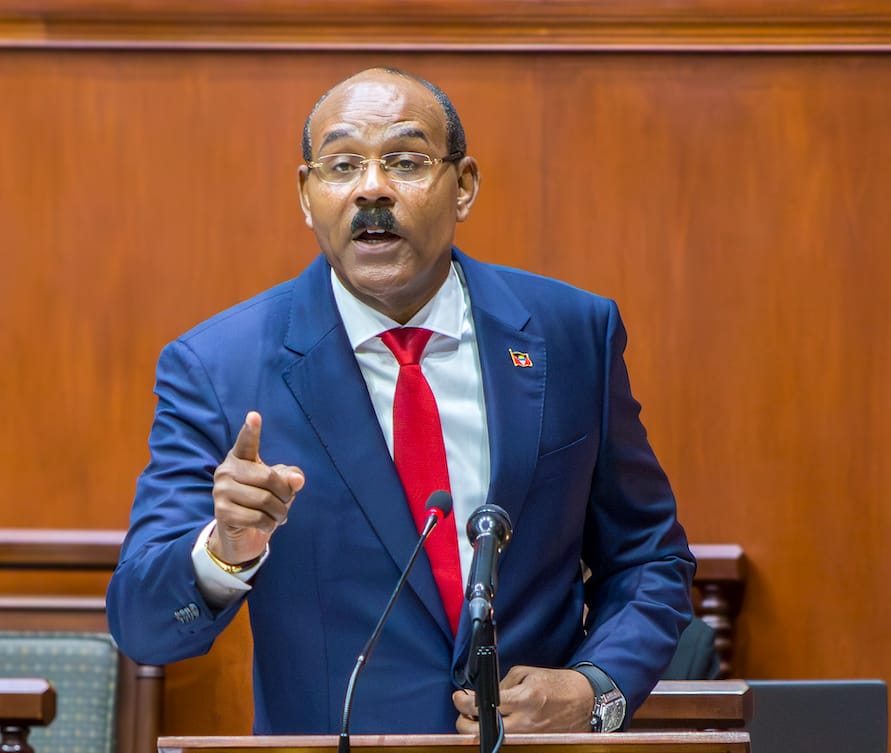
We will introduce a number of fiscal measures in 2024, to strengthen revenue collection, reduce distortions in the tax system and improve taxpayer compliance.” Those were the words of Prime Minister the Hon. Gaston Browne in Parliament on Friday as he presented the government’s 2024 National Budget.
During the presentation, Prime Minister Browne announced adjustments to several of the taxes charged to individuals and businesses. He also announced the widening of the list of items that are zero rated for the additional two percent increase in the rate of the Antigua and Barbuda Sales Tax (ABST).
PM Browne was quick to note that despite the adjustments, Antigua and Barbuda remains the country with the lowest rate of taxation in the OECS region and beyond within the CARICOM community.
“It should be noted that even with the revenue reforms; tax to GDP, to include organic revenue growth will, only increase by 0.7 percent to 15.7 percent; we will still have the lowest tax to GDP ratio and revenue to GDP ratio in the region,” he detailed.
The adjustments in the taxes include the following;
- Implementing the increased property tax rate on properties valued at $3 million or more.
- Implementing a 10% excise tax on alcohol, tobacco, and cannabis products.
- Increasing the Money Transfer Levy from 2% to 5%.
- Broadening the ABST tax base by enhancing the list of services that would attract the ABST – including online streaming services. We will also end the concessionary ABST rate applicable to several transactions, most notably in the tourism sector.
- Increasing the ABST rate from 15% to 17% and applying this rate to the tourism sector, which currently attracts a rate of 14%.
Meanwhile, government will continue to pursue its social relief programme by extending the extending the ABST zero-rated items. These items include:
- most fruits and vegetables to include but not limited to bananas, oranges, grapes, potatoes, broccoli, cauliflower and lettuce
- baby products
- dry goods and oils to include pasta, sugar, corn meal, flour, rice, and cooking oils
- chicken, fish, local produced meats, eggs, canned sardines and tuna
- bread
- cereals, cheese and milk
- water
- medicine, pharmaceutical supplies, and adult diapers
Additionally, exempt supplies for use in the agriculture and fisheries sectors will not be affected by the change in the ABST rate, he added.
The Antigua and Barbuda government is proposed a National Budget of $1.9 billion for the fiscal year 2024.
Prime Minister Browne told parliamentarians and the nation that the total revenues and grants for 2024 will amount to $1.2 billion which represents 18.7 percent of GDP. Total expenditures, excluding amortization payments, will amount to $1.3 million or 20 percent of GDP. Amortization payments have been tagged at $569.5 million or 8.9 percent of GDP and the country’s net financing requirements is $649.7 million or 10.1 percent of GDP.
PM Browne explained that in order to meet the net financing requirements for Budget 2024, the government will primarily rely on the issuance of securities on the Regional Government Securities Market, which will amount to $250 million, and disbursement of loans and advances amounting to $210 million.
Debate on the 2024 Budget will commence on Tuesday 19th December 2023.
Advertise with the mоѕt vіѕіtеd nеwѕ ѕіtе іn Antigua!
We offer fully customizable and flexible digital marketing packages.
Contact us at [email protected]

















THE CAPTION SAYS
“new fiscal measures to strengthen revenue collection” Is this a trick question? Maybe by eyes need checking …can some intelligent reader point out one measure that will be introduce to strengthen revenue COLLECTION. Is increasing taxes a measure that strengthen collection?
ANR, again you got it wrong, The story said TO INTRODUCE, but you captioned it INTRODUCES. Big, big, big difference.
Maybe someone at ANR is deliberately doing this, because it happens a lot. Or someone there is not too bright with words.
When they are reporting what someone said, they have to quote the source, not paraphrase and get it wrong.
Comments are closed.